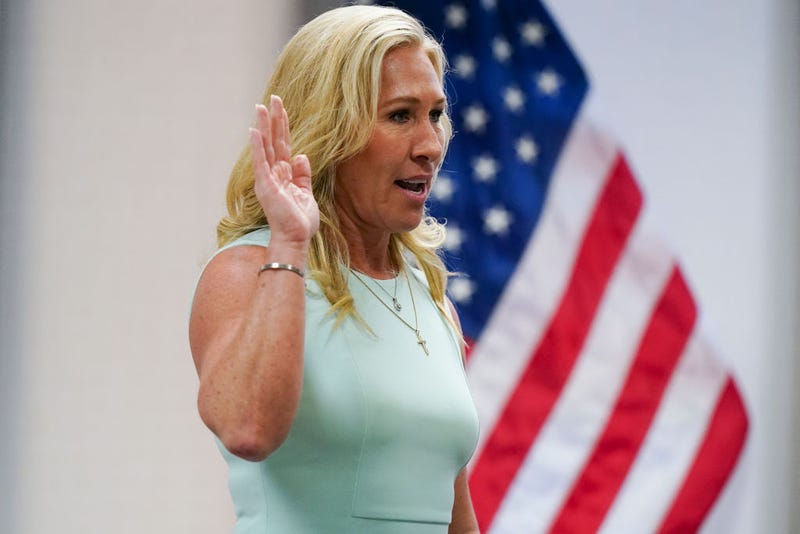
“No, I did not say I believe in Qanon,” said Georgia Rep. Marjorie Taylor Greene Friday during her testimony at an administrative hearing on a 14th Amendment challenge to her candidacy for reelection.
QAnon, is a notorious conspiracy theory “popular among a range of right-wing extremists and even some public supporters of President Trump,” according to the Anti-Defamation League. According to Forbes, Greene leveraged support of QAnon to gain a large social media following ahead of the 2020 election.
QAnon first gained traction in 2017 on the 4chan chat room website.
“It is first and foremost an online trolling and disinformation movement,” with tens of thousands of adherents, according to the ADL. Adherents believe that an anonymous person (or people) who post online as Q has information regarding world governments. This information indicates that those governments are “being controlled by a shadowy cabal of pedophiles,” that former President Donald Trump will bring to justice.
“Q is a patriot. He is someone that very much loves his country, and he’s on the same page as us, and he is very pro-Trump,” Greene said in a 2017 video posted to YouTube that has since been made private, according to The Washington Post.
“While the ADL does not believe that all QAnon adherents are inherently extremists, this is a dangerous theory that has inspired violent acts,” said the organization. According to ABC News, belief in QAnon has been a common thread linking people connected to the deadly riot at the U.S. Capitol on Jan. 6.
More recently, the group has promoted false theories that former President John F. Kennedy – who was killed at age 46 in 1963 – is still alive and young. Some “attribute his longevity to the curative powers of med beds,” according to the Daily Beast.
Greene, a Republican, was elected in the election for Georgia’s 14th Congressional District and took office in January 2021. Her term expires next January and she is on the ballot for the May primary. Five Georgia voters have sought to have her disqualified from running based on alleged comments she made in connection to the Capitol riot last January.
By 2021 Greene said that she regretted her earlier support of QAnon, according to a CNBC report.
“I was allowed to believe things that weren’t true and I would ask questions about them and talk about them,” Greene said, “and that is absolutely what I regret.”
During her testimony Friday, Greene brought up QAnon while being questioned about a 2019 CNN article.
“You sound like you have as many conspiracy theories as QAnon at this point,” she said as a lawyer asked her to confirm the CNN report regarding her comments regarding an event supporting Trump’s border wall project.
Then, the lawyer asked “well, you believe in QAnon, right?” Greene denied having said she believed in the conspiracy theory.
While she has distanced herself from QAnon, Greene admitted in her testimony that she was researching election fraud around the time of the Capitol riot, a subject tied to QAnon and Donald Trump supporters, according to an article in the Nature journal.
“We were mostly reading information about election fraud,” she said, “and preparing to object.”
Many rioters came to the Capitol with hopes of preventing the certification of votes for current President Joe Biden, who they believed did not actually win the election. Trump supported this theory during Washington D.C. rally held shortly before the insurrection.
Despite her comment regarding election fraud, Greene also said that she would not have attempted to prevent the certification of votes for Biden. Business Insider reported that she has made statements contradicting this in the past.
According to C-SPAN, Judge Charles Beaudrot is expected to make a recommendation on Rep. Greene’s candidacy to Georgia Secretary of State Brad Raffensperger, a Republican. If he determines she is ineligible to run an annotation will be added to ballots in Georgia’s 14th District saying votes for Rep. Greene will not be counted.


